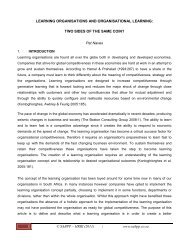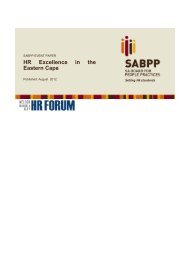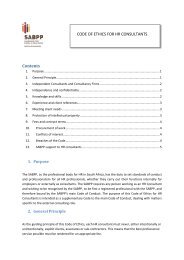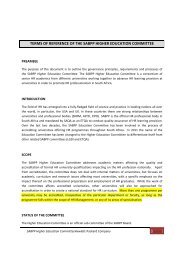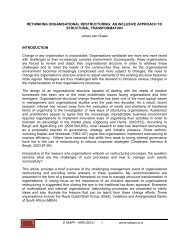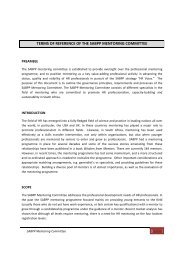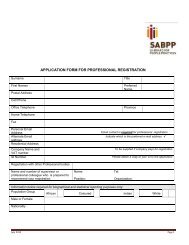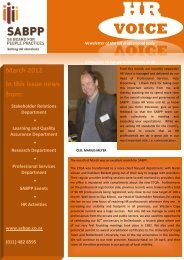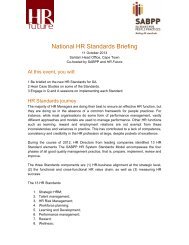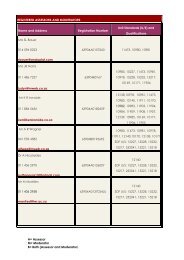May 2012.pdf - SABPP
May 2012.pdf - SABPP
May 2012.pdf - SABPP
Create successful ePaper yourself
Turn your PDF publications into a flip-book with our unique Google optimized e-Paper software.
PROFESSIONAL SERVICES DEPARTMENT<br />
HR managers should champion ethics in the workplace<br />
South African newspapers are full of articles about corruption, fraud, greed, mismanagement, and other forms of<br />
unethical practices in organisations, both in the private and public sectors. This reality raises the question whether it is<br />
really possible to change the current state of affairs. Is it possible for business people and government to change their<br />
behaviour and become more ethical?<br />
Over the last two years, the SA Board for People Practices (<strong>SABPP</strong>), the professional body for HR practitioners,<br />
published three papers that covered the importance of ethics in the field of HR management. First, the King III paper on<br />
the HR implications of governance clearly articulated the important role of HR in promoting ethics in the workplace.<br />
Second, the HR professionalism paper highlighted ethics as one of the most important pillars of HR professionalism.<br />
Third, the <strong>SABPP</strong> position paper on HR Risk Management also emphasises business risk if ethics is not managed<br />
proactively in an organisation. Moreover, in the new book Wisdom from HR Mentors published by <strong>SABPP</strong> and<br />
Knowledge Resources, all the <strong>SABPP</strong> mentors describe the importance of ethics in the field of HR and business in<br />
general. Now, <strong>SABPP</strong> is making the transition from the contextual debate to the practical application of ethics in the HR<br />
function, with a specific focus on the relevance of ethics to the different fields of HR specialisation. Both HR and line<br />
managers should deal with ethical issues when managing people in the workplace.<br />
The King III Code of Governance for South Africa adequately highlights the importance of ethics at board, management<br />
and staff levels and, in particular, the need for an ethical culture. However, Marius Meyer, CEO of <strong>SABPP</strong> warns: “To<br />
think that an ethical code in itself will instil a culture of ethics is short-sighted. Thus, the point of departure in this<br />
guide is that despite increased corporate and government efforts to address ethics, people are at the heart of all<br />
unethical behaviour and practices. No matter how sound your systems, all corporate scandals start with either<br />
employees or managers, in other words, the human resources of an organisation. Therefore, the HR function plays a<br />
critical role in addressing ethical challenges in organisations.” The guide challenges HR professionals and the<br />
organisations they work for to answer these questions:<br />
<br />
<br />
<br />
<br />
<br />
<br />
<br />
<br />
If we focus more on ethics in recruiting and selecting staff, will it make a contribution to ensuring that we create a<br />
larger pool of ethical employees in organisations?<br />
Do we concentrate sufficiently on ethics and values when inducting new employees?<br />
Are we behaving ethically in balancing the need for compliance and performance as part of our performance<br />
management systems?<br />
Do we manage learning and development in an ethical manner, for example when selecting and managing training<br />
providers, or when making decisions about learners entering learning programmes?<br />
When dealing with employees and unions as part of our employment relations system, do we behave in a fair,<br />
equitable and ethical manner?<br />
Utilising salary benchmarking in remuneration, do we encourage greed and reinforce excessive pay packages and<br />
thereby widen the gaps between the rich and the poor in one of the most unequal societies in the world?<br />
What contribution does HR play to create an ethical culture and to reduce unethical behaviour?<br />
How effective is HR in influencing and guiding management on ethical issues and the promotion of an ethical<br />
culture in the organisation?<br />
Pauls Gibbons is Vice-chair of the <strong>SABPP</strong> Ethics Committee. Earlier versions of this article appeared in HR<br />
8<br />
Future and The Star.



